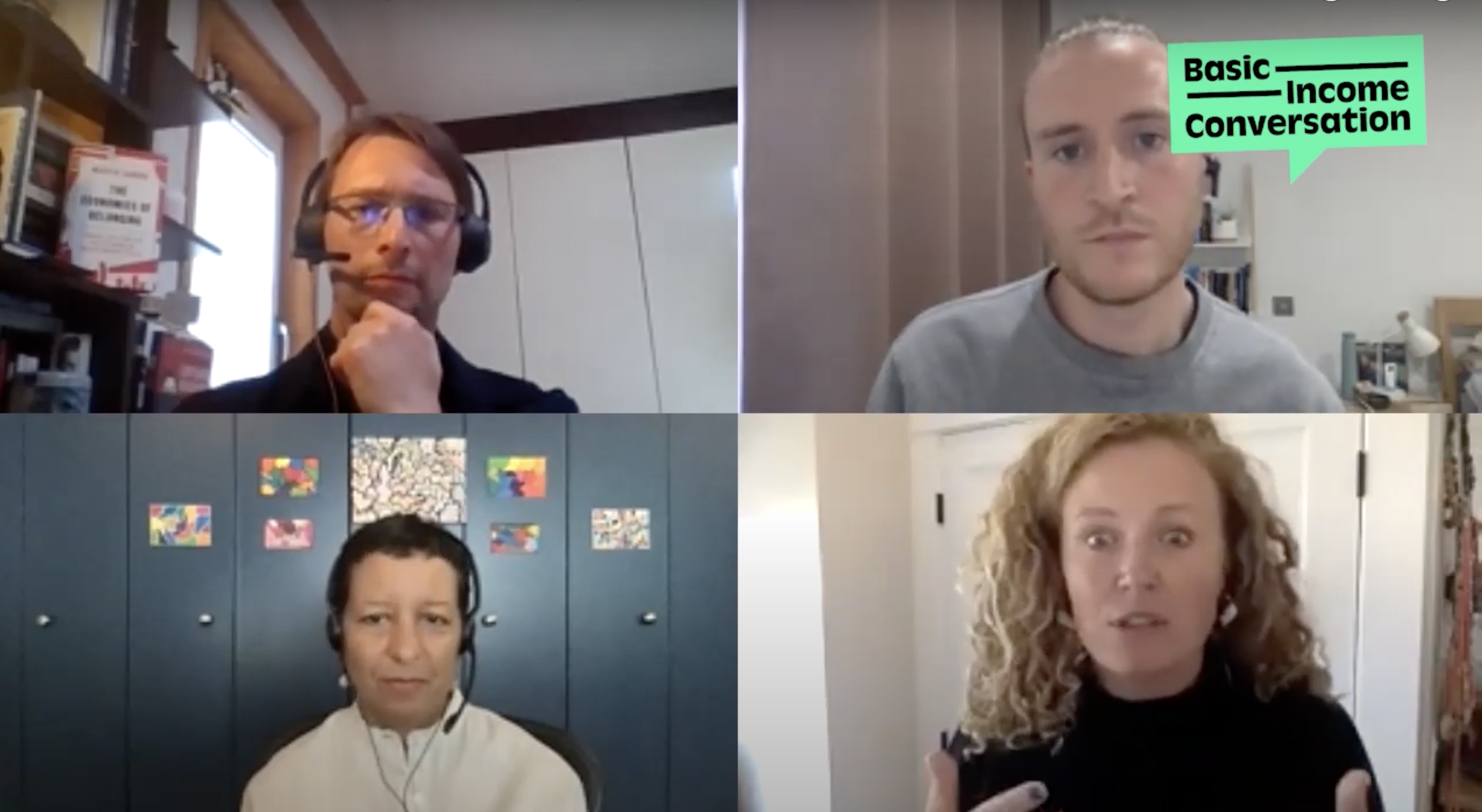Basic Income in the US: is the Overton window open?
Posted on 28 May 2021 Categories: Blog, New economic models
by Caroline Hartnell
As outlined in March’s Talking Points, no-strings-attached direct cash payments are central to Biden’s stimulus package. While this is not Universal Basic Income (UBI), also known as Basic Income, is it helping to legitimise the role of direct payments? And is the Overton window now open for a Basic Income, both in the US and here in the UK? This was the topic of a webinar on ‘Stimulus Checks and what they mean for the global Basic Income Conversation’, part of Basic Income Conversation’s Research Network Seminar Series.

In the view of Natalie Foster (co-founder and chair of the Economic Security Project, a network to support the exploration of Basic Income in the US), ‘one silver lining of last year is the idea of cash with no strings attached and freedom to spend it as people want’. Biden’s Covid-19 Stimulus Package will provide direct payments of up to $1,400 to most Americans and child tax credits of $250 per month for each child for 82 per cent of parents. Stimulus cheques have averaged around $55,000 per household over the last year, with large amounts going to communities of colour.
Baby steps towards Basic Income in the US
In the US as here in the UK, critics of Basic Income argue that free money would eliminate the incentive to work. But, Foster reported, a recent trial of Basic Income payments in Stockton, California has not borne out these fears. The trial gave $500 per month for two years to 125 Stockton residents who earned less than the city’s median household income of $46,033, with no rules on how to spend it. After two years, people found full-time work at double the rate of people who didn’t.
‘Now we have a chance to change racist, punitive policymaking around the social safety net,’ says Foster, ‘making child payments permanent for 82 per cent of US parents. This would be a baby step towards Basic Income in the US.’ This she regards as ‘very possible’ – though she sees permanently introducing stimulus cheques, which would be tied automatically to economic conditions, as ‘a harder hill to climb’.
Almaz Zelleke (Professor of Practice in Political Science at NYU Shanghai) reminded us that stimulus payments began under Trump, as had happened before in times of economic crisis, so they were ‘already in the toolbox’. Trump also added a $600 supplement to the weekly unemployment payment, with no expectations that people would be looking for work – as there was none available. Nevertheless, the spectre of lazy workers has raised its ugly head. It seems that workers aren’t keen to go back to restaurants and bars, where pay is very low – are we giving people too much? On a macro level, says Zelleke, the evidence is not there: ‘overall people are going back to work, but the supplement might be making people reconsider certain jobs.’
The significance of Biden’s approach, in her view, is that the child tax credit goes to lower-income families, whereas previously it went only to better-off people who had tax to pay. Biden’s more recently announced American Families Plan proposes spending on ‘soft infrastructure’ – the ‘infrastructure of care’, for people with children, elders, people with disabilities. All this represents a really important shift from emergency crisis response to addressing structural issues in the economy, to investment economics. ‘The US traditionally has an aversion to giving money except to people who are “deserving” in particular jobs, etc – we are very afraid of free-riding, people taking support but not contributing. How do we build on this shift?’ asks Zelleke.

Social security system or tax system?
We need a legislative push, to make changes permanent, and an implementation push – to expand low-cost banking for the unbanked and put payments through the social security system. Typically, money goes through the tax system, she says, but not all low-income workers pay taxes.
Martin Sandbu (Financial Times European Economics Commentator) disagrees on this. In his view, it’s important to keep Basic Income in the tax system with payments taking the form of refundable tax credits – being refundable means they get to the poorest people but are not billed as a straight direct payment. ‘Basic Income could be introduced as a negative income tax model,’ he says. ‘It’s politically more acceptable to keep the discussion around having a redistributive tax system.’
He also likes the idea as direct payments as ‘automatic stabilisers of the economy, things that kick in automatically in a downturn’. It’s generally agreed that these are a good idea, he says. Direct payments are easier to defend as an insurance mechanism for the economy.
Moving towards Basic Income in Europe?
How does all this look from here? Things in the US always open up possibilities in Europe, says Sandbu. The fact that the US is making direct payments, which is unusual, will be noticed. European politicians will be watching to see if it works in the US. Direct payments are criticised for not being targeted: they will go to some who don’t need them. Sandbu’s reply: you’ll reach people who do need them, so we should see them as better targeted not wasted.
In Europe, he says, the pandemic has brought a realisation that it’s not that easy to reach people. Even in Norway, with its ‘most sophisticated welfare state’, there is now a discussion of Basic Income. ‘The practical challenge of helping the people you want to help has been raised at policy level. There is also a recognition that welfare states are not working that well.’ There are ‘precariats’ in Europe, he says, as in the US, both in the unregulated UK labour market and in the much more regulated French and Spanish labour markets. Significantly the European Commission is now proposing guaranteed minimum wage levels. This is not the same as Basic Income, says Sandbu, ‘but moving in a favourable direction’.
When it comes to child tax credits, Biden has introduced something that all of Europe already has – although the payments are much more generous than we have in the UK. In the US, says Sandbu, this is being discussed as part of the Basic Income conversation. ‘We don’t acknowledge here that we already have an element of Basic Income, one of the most secure bits of the welfare state.’
The Green Deal could also nudge policy in this direction, he says, ‘think the gilets jaunes revolt against a rise in fuel prices’. People are now aware that the carbon transition has to be done in a socially just way. ‘There is an opening for taxing carbon and redistributing it so the worst off aren’t hit by the transition.’ It’s important that we see Basic Income as good for the functioning of the economy, he says, enabling people to leave poor jobs for better ones – which is good for productivity.

Radical or incremental?
Is this a moment for reforming the social security system or for a once-in-a-lifetime realignment? For Zelleke, it’s time to think big rather than be pragmatic. The chance to create real change could end in 2022 in the US, she says, depending on the mid-term election results. How can we prepare the ground for implementing this on a more permanent basis next year? ‘We need to get cheques out to individuals and show they can make a difference in their lives.’ She also mentions reforming benefit cliffs: at present you lose Medicare once you get past a given income. Getting rid of them would be another move in the direction of a seamless Basic Income programme. ‘We need to build the infrastructure when they’re not looking.’
Sandbu also favours ‘going big’. The UK government is trying to sell itself as a radical, reformist government. Radical reform is easier to push through than incremental tweaks. ‘It’s harder for opponents to resist, and success makes it hard to undo.’ The key thing here, he says, is to aim for permanence and irreversibility – ‘reforms that will be impossible to reverse, if introduced. If you introduce a minimum wage, it’s hard to reverse. In the UK and Europe, the need for big reform is less than in the US, but it’s still there.’
In Foster’s view, we need to be both radical and incremental. We can adopt a ‘folksy demeanour, just a tax credit’, but this is a significant shift from neoliberalism, she says. She sees direct payments as good politics. ‘The Georgians ran on stimulus cheques; they’re very popular among both parties.’ People will start getting child tax payments in July. ‘Taking this away will be harder,’ she says. ‘Will it become part of the social contract that parents receive money to help with bringing up children?’
What advice for Basic Income campaigners in the UK?
Foster advises that we invest in social movements as well as politics. It wasn’t a given that the response to the pandemic would include direct cash payments, she says. In the previous crisis the US expanded tax credits, which went only to taxpayers. Part of the reason for the different response this time were the social movements campaigning around a Guaranteed Minimum Income and Basic Income. Many mayors have campaigned on this, she says. ‘Our job as social movements is to hold core values – no strings attached, no inspectors, none of the punitive aspects of the existing safety net.’
The issue of the deserving/undeserving seems to have temporarily gone out of the window in the US but that’s not the case in the UK, which is probably why it colours both Zelleke’s and Sandbu’s advice. Sandbu’s insistence on keeping the Basic Income conversation inside tax thinking is to avoid talk of the deserving and the needy. Zelleke suggests we start looking for opportunities to make permanent changes to existing systems that make them more like a Basic Income, seeing this as incremental progress towards the full policy. Many pilots of Basic Income are happening, she says. Their aim is to produce good stories, ‘but many of these are around whether people work or not, which focuses on the deserving. Instead, we should focus on one thing that would shift the system in favour of unconditionality and universality.’
Click here to watch the whole discussion.
Want to keep up-to-date with more articles like this? Sign up to our newsletter.
Posted on 28 May 2021 Categories: Blog, New economic models
